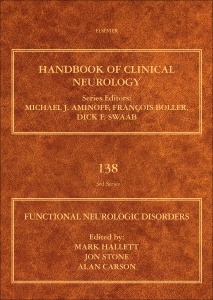Description
Functional Neurologic Disorders
Handbook of Clinical Neurology Series
Language: English
Subject for Functional Neurologic Disorders:
680 p. · 20.9x27.7 cm · Hardback
Description
/li>Contents
/li>Readership
/li>Comment
/li>
Functional Neurologic Disorders, the latest volume in the Handbook of Clinical Neurology series, summarizes state-of-the-art research findings and clinical practice on this class of disorders at the interface between neurology and psychiatry. This 51-chapter volume offers an historical introduction, chapters on epidemiology and pathophysiolology, a large section on the clinical features of different type of functional neurologic symptoms and disorders (including functional movement disorders, non-epileptic seizures, dizziness, vision, hearing, speech and cognitive symptoms), and then concluding with approaches to therapy.
This group of internationally acclaimed experts in neurology, psychiatry, and neuroscience represent a broad spectrum of areas of expertise, chosen for their ability to write clearly and concisely with an eye toward a clinical audience. This HCN volume sets a new landmark standard for a comprehensive, multi-authored work dealing with functional neurologic disorders (also described as psychogenic, dissociative or conversion disorders).
Section 1: History
Chapter 1: A brief history of hysteria: From the ancient to the modern
Chapter 2: Charcot, hysteria, and simulated disorders
Chapter 3: Neurologic approaches to hysteria, psychogenic and functional disorders from the late 19th century onwards
Chapter 4: Freud's hysteria and its legacy
Section 2: Epidemiology, etiology, and mechanism
Chapter 5: Epidemiology
Chapter 6: Neurophysiologic studies of functional neurologic disorders
Chapter 7: Imaging studies of functional neurologic disorders
Chapter 8: Dissociation and functional neurologic disorders
Chapter 9: Hypnosis as a model of functional neurologic disorders
Chapter 10: Psychologic theories in functional neurologic disorders
Chapter 11: Voluntary or involuntary? A neurophysiologic approach to functional movement disorders
Chapter 12: Neurobiologic theories of functional neurologic disorders
Chapter 13: Stress, childhood trauma, and cognitive functions in functional neurologic disorders
Chapter 14: Do (epi)genetics impact the brain in functional neurologic disorders?
Section 3: Symptoms (including signs and investigations)
Chapter 15: Assessment of patients with functional neurologic disorders
Chapter 16: The classification of conversion disorder (functional neurologic symptom disorder) in ICD and DSM
Chapter 17: Neurologic diagnostic criteria for functional neurologic disorders
Chapter 18: Functional limb weakness and paralysis
Chapter 19: Functional tremor
Chapter 20: Functional dystonia
Chapter 21: Functional jerks, tics, and paroxysmal movement disorders
Chapter 22: Psychogenic (functional) parkinsonism
Chapter 23: Functional gait disorder
Chapter 24: Functional sensory symptoms
Chapter 25: Nonepileptic seizures – subjective phenomena
Chapter 26: Nonepileptic seizures – objective phenomena
Chapter 27: Psychogenic nonepileptic seizures: EEG and investigation
Chapter 28: Functional coma
Chapter 29: Functional and simulated visual loss
Chapter 30: Functional eye movement disorders
Chapter 31: Functional facial and tongue movement disorders
Chapter 32: Functional auditory disorders
Chapter 33: Functional speech disorders: clinical manifestations, diagnosis, and management
Chapter 34: Functional voice disorders: Clinical presentations and differential diagnosis
Chapter 35: Psychologic/functional forms of memory disorder
Chapter 36: Functional (dissociative) retrograde amnesia
Chapter 37: Functional (psychogenic) dizziness
Chapter 38: Urologic symptoms and functional neurologic disorders
Chapter 39: Functional disorders of swallowing
Chapter 40: Pediatric functional neurologic symptoms
Chapter 41: Posttraumatic functional movement disorders
Chapter 42: Factitious disorders and malingering in relation to functional neurologic disorders
Section 4: Treatment
Chapter 43: Prognosis of functional neurologic disorders
Chapter 44: Explanation as treatment for functional neurologic disorders
Chapter 45: Physical treatment of functional neurologic disorders
Chapter 46: Psychologic treatment of functional neurologic disorders
Chapter 47: Hypnosis as therapy for functional neurologic disorders
Chapter 48: Nature of the placebo and nocebo effect in relation to functional neurologic disorders
Chapter 49: The role of placebo in the diagnosis and treatment of functional neurologic disorders
Chapter 50: Transcranial magnetic stimulation and sedation as treatment for functional neurologic disorders
Chapter 51: Inpatient treatment for functional neurologic disorders
Index
- Offers a comprehensive interdisciplinary approach for the care of patients with functional disorders seen in neurologic practice, leading to more efficient prevention, management, and treatment
- Provides a synthesis of research efforts incorporating clinical, brain imaging and neurophysiological studies
- Fills an existing gap between traditional neurology and traditional psychiatry
- Contents include coverage of history, epidemiology, clinical presentations, and therapy
- Edited work with chapters authored by leaders in the field, the broadest, most expert coverage available




